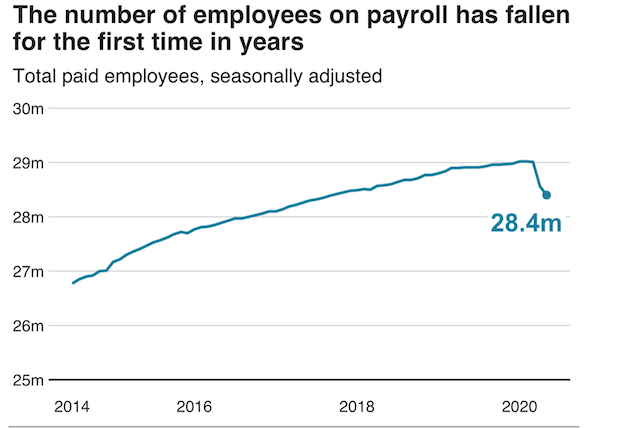The Office for National Statistics said there had been a record fall in the number of job vacancies in the period. The early estimates reflect the impact of around six weeks of lockdown in the UK, in which almost nine million workers have been furloughed. But economists say the full impact on employment will not be felt until wage support schemes end in October.
"The slowdown in the economy is now visibly hitting the labour market, especially in terms of hours worked," said Jonathan Athow, deputy national statistician for economic statistics at the Office for National Statistics (ONS).
"Early indicators for May show that the number of employees on payrolls were down over 600,000 compared with March."

He added that the number of people claiming work related benefits had climbed again, although "not all of these people are necessarily unemployed".
Overall, the UK unemployment rate held steady at 3.9% in the three months to April - the likely result of the massive wage support schemes brought in by the government to prevent job losses.
Reflecting this, the ONS said the total number of weekly hours worked in period had hit 959.9 million - down by a record 94.2 million, or 9%, on the previous year.
There were also an estimated 476,000 vacancies in the UK in March to May 2020 - 365,000 fewer than a year earlier.
'Weakened dramatically'
The changes come after large parts of the economy were shut down to fight coronavirus.
However, Capital Economics economist Ruth Gregory warned bigger unemployment rises were on their way.
"It was abundantly clear in every other indicator that the labour market has weakened dramatically," she said.
"Despite the apparent stability of the actual unemployment rate, the labour market data were still pretty awful. And some of this will surely start to filter through into the actual unemployment figures as the government's job furlough scheme is wound down from August."
Tej Parikh, chief economist at the Institute of Directors, agreed: "The furlough scheme continues to hold off the bulk of job losses, but unemployment is likely to surge in the months ahead."
BBC NEWS


 Prime Minister Keir Starmer's 2025 Easter message
Prime Minister Keir Starmer's 2025 Easter message After Nesil Caliskan a by-election will be held in Jubilee ward in Enfield
After Nesil Caliskan a by-election will be held in Jubilee ward in Enfield Publishing the analysis, Labour’s Cllr Ergin Erbil said Everybody in Enfield deserves basic rights
Publishing the analysis, Labour’s Cllr Ergin Erbil said Everybody in Enfield deserves basic rights Gaza-Israel conflict Statement from Cllr Ergin Erbil, Leader of Enfield Council
Gaza-Israel conflict Statement from Cllr Ergin Erbil, Leader of Enfield Council The European Union called on Turkey to uphold democratic values
The European Union called on Turkey to uphold democratic values Turkish citizens in London said Rights, Law, Justice
Turkish citizens in London said Rights, Law, Justice The Council of Turkish Cypriot Associations Geneva response letter
The Council of Turkish Cypriot Associations Geneva response letter Sustainable Development and ESG, Will This Become the Course for Turkic World
Sustainable Development and ESG, Will This Become the Course for Turkic World The 'Prince of Paris' has impressed in his first EuroLeague season
The 'Prince of Paris' has impressed in his first EuroLeague season Saran Media And Euroleague Basketball Extend Media Rights Partnership for Four More Years
Saran Media And Euroleague Basketball Extend Media Rights Partnership for Four More Years Will Rangers be Jose Mourinho’s next victim?
Will Rangers be Jose Mourinho’s next victim? Jose Mourinho's Fenerbahce face Rangers on Thursday
Jose Mourinho's Fenerbahce face Rangers on Thursday Barclays has become the biggest UK lender so far to cut mortgage rates
Barclays has become the biggest UK lender so far to cut mortgage rates THE SPRING STATEMENT EXPLAINED, UK ECONOMIC OUTLOOK AND GROWTH FORECASTS
THE SPRING STATEMENT EXPLAINED, UK ECONOMIC OUTLOOK AND GROWTH FORECASTS Launch of Made in Enfield gift shop to celebrate local artists and designers
Launch of Made in Enfield gift shop to celebrate local artists and designers Trial used smart Wi-Fi sensors for live building occupancy data to optimise
Trial used smart Wi-Fi sensors for live building occupancy data to optimise















